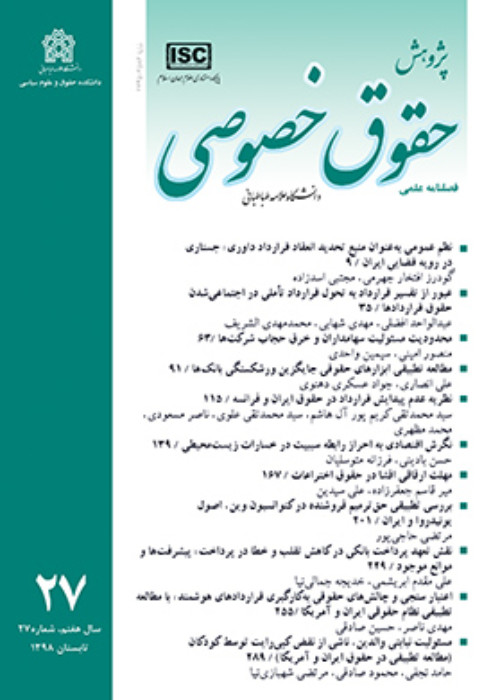Formalism in Commercial Documents and its Interaction with Will
Author(s):
Article Type:
Research/Original Article (دارای رتبه معتبر)
Abstract:
Formalism in law has generally been manifested in three positions that are completely different from each other. The first type of formalism is formalism in the realm of legal rule, which is used from the topics of Law philosophy and the concept of validity of legal rule based on formal criteria, regardless of its efficiency and content evaluation. In other words, the legal rule that has gone through the necessary formalities is respected, even if it is not efficient, or it has ignored the fundamentals and basic factors of law such as: economy, culture, and the like. Another type of formalism is in the realm of legal reasoning and is considered one of the topics of law logic and is used to emphasize the wording and form of expressions, even in conflict or at least, ignoring the spirit of the law. In this way, legal reasoning is actually reduced to formal logic or mathematical logic. Its function is to require the courts to understand the text of the legal article and make logical inferences from the legal article, for this reason, it is sometimes called mechanical legal theory. The third type of formalism is dedicated to the realm of legal acts. This type of formalism, which is the subject of this research, can be presented in interaction with the will of individuals, which to the concept of the requirement of certain exclusive and binding forms in legal acts and the regulation and issuance of documents, and the lack of freedom in the form of legal acts in creating, transferring and the guarantee of commercial documents is contrary to the originality of consent or even the principle of freedom of expression of will.Commercial documents in a special sense in terms of the role they have in the economic relations of individuals, especially merchants, follow certain systems and have certain characteristics. But the most basic feature of these documents is their formality. In the sense that the existence of intention and declaration in the creation, transfer, guarantee, and even payment of commercial documents although necessary, is not sufficient, but the observance and application of the form is relevant and has consequences on it. In fact, the legal form is dependent on the will and is understood in interaction with it and it is: "an external and tangible element that discovers, completes, proves, supports or directs the inner will or replaces it." which is relevant in the realm of legal actions, on this basis, if the will is assumed to mean the creation, change, transfer or cancellation of a right or legal status, the discussion of the form in legal events will not be relevant, because the form in legal events is an empirical manifestation in their sensible face. Although this form can be effective in law, this form of influence has a philosophical basis and cannot be called a legal form. Special attention and special credit to the form in commercial documents are often the initiatives of merchants and have evolved throughout history and have been approved by the legislator, jurisprudence and legal doctrine in international conventions and different countries. Contrary to other branches of private law, including contract law, and the validity of the principle of the sovereignty of the will as an indisputable principle and a symbol of the growth and maturity of private law, basically, formalism causes slowness and sometimes complexity in the contractual and economic relations of individuals, especially merchants, while, considering the philosophy of the separation of commercial documents and also the basis of creating these documents, the appreciation of formalism in this branch of private law is based on speed, ease and reliability in commercial relations. On the same basis, the idea of replacing the commercial document with a banknote as a container of money (not money itself) is one of the important reasons and foundations for the creation and use of commercial documents, which has a close relationship with the general economic order, with the explanation that money is a form of credit resulting from the power and authority of the government, which may be poured into any format, whether it is a banknote, a credit card, a check, or digital currency. Therefore, commercial documents are not based on the basis of replacing that credit essence (money), but on the basis of being recognized as a container of money and a substitute for banknotes, which is the most obvious example of a container of money. This article tried, different from the researches, to analyze the concept and ratio of formalism interaction with will and its foundations in commercial documents.
Keywords:
Language:
Persian
Published:
Journal of Private Law, Volume:12 Issue: 44, 2024
Pages:
221 to 254
magiran.com/p2684763
دانلود و مطالعه متن این مقاله با یکی از روشهای زیر امکان پذیر است:
اشتراک شخصی
با عضویت و پرداخت آنلاین حق اشتراک یکساله به مبلغ 1,390,000ريال میتوانید 70 عنوان مطلب دانلود کنید!
اشتراک سازمانی
به کتابخانه دانشگاه یا محل کار خود پیشنهاد کنید تا اشتراک سازمانی این پایگاه را برای دسترسی نامحدود همه کاربران به متن مطالب تهیه نمایند!
توجه!
- حق عضویت دریافتی صرف حمایت از نشریات عضو و نگهداری، تکمیل و توسعه مگیران میشود.
- پرداخت حق اشتراک و دانلود مقالات اجازه بازنشر آن در سایر رسانههای چاپی و دیجیتال را به کاربر نمیدهد.
In order to view content subscription is required
Personal subscription
Subscribe magiran.com for 70 € euros via PayPal and download 70 articles during a year.
Organization subscription
Please contact us to subscribe your university or library for unlimited access!


